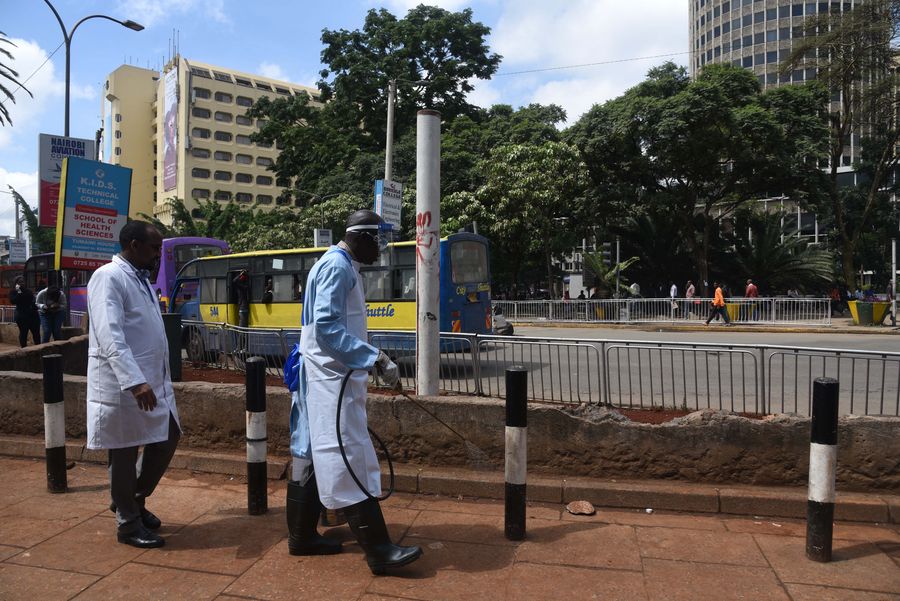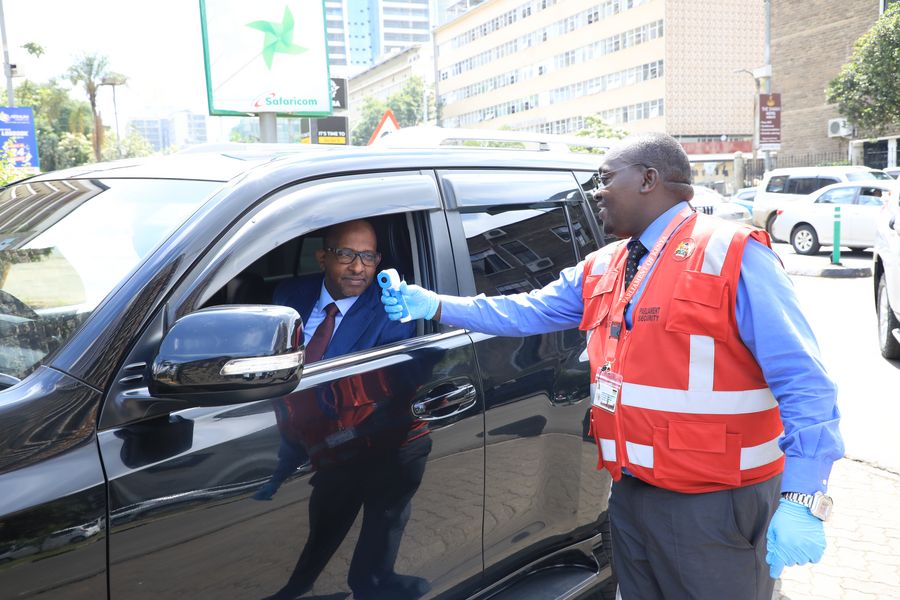
An employee (R) at a local restaurant checks the temperature of a customer at the entrance of the hotel in Nairobi, capital of Kenya, March 17, 2020. Kenya has imposed far-reaching restrictions in a bid to curb the spread of coronavirus. (Xinhua/Fred Mutune)
Kenyans are observing various safety measures at community level to curb the spread of COVID-19.
NAIROBI, March 21 (Xinhua) -- From washing hands with soap before boarding public service buses, commonly known as matatus, to using mobile money, Kenyans are observing various safety measures at community level to curb the spread of coronavirus (COVID-19).
The commuter buses were seen as one of the weakest links in the fight against the disease due to their messy way of operation yet millions of people use them daily.
But they are coming out strongly as operators adopt various hygiene measures.
At Kitengela bus terminus, matatu operators have installed handwashing points to ensure every commuter washes their hands before getting inside the vehicles. Others are offering commuters hand sanitizers.
"We cannot turn our backs against this crisis hoping that the government will win the war on its own. We must play our roles," Andrew Mwangi, a conductor with Rembo Shuttle, which plies the Kitengela route, south of Nairobi, said on Saturday.
He noted that every passenger is expected to clean their hands before getting into the buses. "I have turned away several people who tried getting in without the washing hands," he said.
Inside the vehicles, the operators are also embracing virtual payments as advised by the government. While most people are still using cash, they are not rejecting mobile payments as they used to do before the crisis.
"I am telling passengers to pay via mobile money because it is also safer for me. It is risky to handle dirty cash," he said.

Nairobi County Health department official sprays disinfectant along the streets of Nairobi, capital of Kenya, March 19, 2020. The health officials on Thursday sprayed disinfectant along the streets to prevent the spread of COVID-19. (Xinhua/John Okoyo)
On March 20, the government asked all matatu operators to reduce the number of people they are carrying per trip to increase social distancing.
A 14-seater vehicle would carry eight passengers while 25-seater 15, said Mutahi Kagwe, the Health Cabinet Secretary.
"This also applies to the standard gauge railway train and the commuter train," added Kagwe. Matatu operators said they will comply with the directive but passengers will have to pay a little more.
Similarly, most security guards at public buildings in the East African nation's capital are wearing masks and hand gloves to protect themselves as they interact with tens of people daily.
Going by the number of contacts they make daily, the guards alongside nurses and community health workers are classified as high-risk people.
With the east African nation facing a shortage of sanitizers, enterprising Kenyans have seized the opportunity not only to make money but also ensure the commodities are in high supply.
Roselyn Ngare is among those who started making sanitizers after shortage hit the market on March 13 when Kenya announced its first case of coronavirus.
Ngare said one of the ingredients she is using is glycerol and the products are serving people well.
"I am selling in the neighborhood and online at 100 shillings (1 U.S. dollar) for a 100ml bottle. They have come in handy because they are not available in supermarkets," she said of the products she has branded Roservan.
She dismissed claims of those saying that those selling masks and sanitizers are opportunists seeking to reap from a misfortune.
"The ultimate goal is that we are trying to help mitigate a crisis. What happens if there are no sanitizers at all?" she said.

Kenya's National Assembly Majority leader Aden Duale has his body temperature checked before accessing the Parliament Buildings in Nairobi, capital of Kenya, March 17, 2020. (Xinhua/Fred Mutune)
A majority Kenyans are also maintaining social distance at public places, have stopped shaking hands and those who suspect they may have the virus have self-quarantined.
Ernest Manuyo, a business lecturer at Pioneer Institute in Nairobi, said public awareness is key in the fight against coronavirus spread.
"The bigger fight against the disease is won at the community level going by the Chinese experience. It is heartwarming that Kenyans know this and are taking various measures," he said.
The Kenyan Health Ministry has also enhanced public education via mobile phone, sending text messages to people at least once every day.
Kenya has so far recorded seven cases of infection and on Friday, the government noted that the next 14 days are critical in the fight against COVID-19, with Kagwe warning that if citizens do not take responsibility, the country is staring at a full-blown crisis. ■



